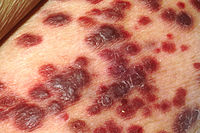
Microglia in frontotemporal lobar degeneration with progranulin or C9ORF72 mutations
Sign Up to like & getrecommendations! Published in 2019 at "Annals of Clinical and Translational Neurology"
DOI: 10.1002/acn3.50875
Abstract: To identify clinicopathological differences between frontotemporal lobar degeneration (FTLD) due to mutations in progranulin (FTLD‐GRN) and chromosome 9 open reading frame 72 (FTLD‐C9ORF72). read more here.
Keywords: c9orf72; frontotemporal lobar; microglia frontotemporal; lobar degeneration ... See more keywords

Presymptomatic spinal cord pathology in c9orf72 mutation carriers: A longitudinal neuroimaging study
Sign Up to like & getrecommendations! Published in 2019 at "Annals of Neurology"
DOI: 10.1002/ana.25520
Abstract: C9orf72 hexanucleotide repeats expansions account for almost half of familial amyotrophic lateral sclerosis (ALS) and frontotemporal dementia (FTD) cases. Recent imaging studies in asymptomatic C9orf72 carriers have demonstrated cerebral white (WM) and gray matter (GM)… read more here.
Keywords: presymptomatic spinal; study; pathology; c9orf72 ... See more keywords

Faster Cortical Thinning and Surface Area Loss in Presymptomatic and Symptomatic C9orf72 Repeat Expansion Adult Carriers
Sign Up to like & getrecommendations! Published in 2020 at "Annals of Neurology"
DOI: 10.1002/ana.25748
Abstract: C9orf72 expansion is the most common genetic cause of frontotemporal dementia (FTD). We examined aging trajectories of cortical thickness (CTh) and surface area in C9orf72 expansion adult carriers compared to healthy controls to characterize preclinical… read more here.
Keywords: expansion; surface area; adult carriers; c9orf72 ... See more keywords

Myelin loss in C9orf72 hexanucleotide expansion carriers
Sign Up to like & getrecommendations! Published in 2022 at "Journal of Neuroscience Research"
DOI: 10.1002/jnr.25100
Abstract: The most frequent genetic cause of frontotemporal lobar degeneration (FTLD) and amyotrophic lateral sclerosis (ALS) is the hexanucleotide repeat expansion in C9orf72. An important neuropathological hallmark associated with this mutation is the accumulation of the… read more here.
Keywords: myelin loss; frcx; loss; c9orf72 ... See more keywords

CRISPR deletion of the C9ORF72 promoter in ALS/FTD patient motor neurons abolishes production of dipeptide repeat proteins and rescues neurodegeneration
Sign Up to like & getrecommendations! Published in 2020 at "Acta Neuropathologica"
DOI: 10.1007/s00401-020-02154-6
Abstract: GGG GCC (G4C2) repeat expansion in the first intron of C9ORF72 is the most common genetic cause of amyotrophic lateral sclerosis (ALS) and frontotemporal dementia (FTD) [6, 11]. Brain tissues from affected individuals show characteristic… read more here.
Keywords: repeat; deletion; c9orf72; poly poly ... See more keywords

Synaptic dysfunction and altered excitability in C9ORF72 ALS/FTD
Sign Up to like & getrecommendations! Published in 2018 at "Brain Research"
DOI: 10.1016/j.brainres.2018.02.011
Abstract: Amyotrophic lateral sclerosis (ALS) is characterized by a progressive degeneration of upper and lower motor neurons, resulting in fatal paralysis due to denervation of the muscle. Due to genetic, pathological and symptomatic overlap, ALS is… read more here.
Keywords: dysfunction; disease; c9orf72; als ftd ... See more keywords

Genome-wide synthetic lethal CRISPR screen identifies FIS1 as a genetic interactor of ALS-linked C9ORF72
Sign Up to like & getrecommendations! Published in 2020 at "Brain Research"
DOI: 10.1016/j.brainres.2019.146601
Abstract: Mutations in the C9ORF72 gene are the most common cause of amyotrophic lateral sclerosis (ALS). Both toxic gain of function and loss of function pathogenic mechanisms have been proposed. Accruing evidence from mouse knockout studies… read more here.
Keywords: genome wide; c9orf72; wide synthetic; lethal crispr ... See more keywords

p53 is a central regulator driving neurodegeneration caused by C9orf72 poly(PR)
Sign Up to like & getrecommendations! Published in 2021 at "Cell"
DOI: 10.1016/j.cell.2020.12.025
Abstract: The most common genetic cause of amyotrophic lateral sclerosis (ALS) and frontotemporal dementia (FTD) is a GGGGCC repeat expansion in the C9orf72 gene. We developed a platform to interrogate the chromatin accessibility landscape and transcriptional… read more here.
Keywords: p53 central; neurodegeneration; c9orf72; p53 ... See more keywords

A Chemical Screen Identifies Compounds Limiting the Toxicity of C9ORF72 Dipeptide Repeats.
Sign Up to like & getrecommendations! Published in 2019 at "Cell chemical biology"
DOI: 10.1016/j.chembiol.2018.10.020
Abstract: The expansion of GGGGCC repeats within the first intron of C9ORF72 constitutes the most common cause of amyotrophic lateral sclerosis (ALS) and frontotemporal dementia (FTD). Through repeat-associated non-ATG translation, these expansions are translated into dipeptide… read more here.
Keywords: bet bromodomain; toxicity; chemical screen; c9orf72 ... See more keywords

The association between repeat number in C9orf72 and phenotypic variability in Turkish patients with frontotemporal lobar degeneration
Sign Up to like & getrecommendations! Published in 2019 at "Neurobiology of Aging"
DOI: 10.1016/j.neurobiolaging.2018.12.007
Abstract: Frontotemporal lobar degeneration (FTLD) describes a group of progressive brain disorders. The expansion of a noncoding GGGGCC (G4C2) hexanucleotide repeat in the C9orf72 gene is a major cause of both familial FTLD and amyotrophic lateral… read more here.
Keywords: turkish patients; repeat; lobar degeneration; c9orf72 ... See more keywords

Selective C9orf72 G-Quadruplex-Binding Small Molecules Ameliorate Pathological Signatures of ALS/FTD Models
Sign Up to like & getrecommendations! Published in 2022 at "Journal of Medicinal Chemistry"
DOI: 10.1021/acs.jmedchem.2c00654
Abstract: The G-quadruplex (G4) forming C9orf72 GGGGCC (G4C2) expanded hexanucleotide repeat (EHR) is the predominant genetic cause of amyotrophic lateral sclerosis (ALS) and frontotemporal dementia (FTD). Developing selective G4-binding ligands is challenging due to the conformational… read more here.
Keywords: quadruplex binding; binding small; c9orf72; g4c2 ... See more keywords